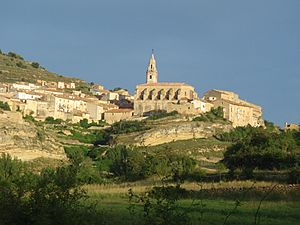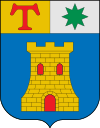Tronchón facts for kids
Quick facts for kids
Tronchón
|
||
|---|---|---|

Tronchon August 2008
|
||
|
||
| Country | ||
| Autonomous community | ||
| Province | Teruel | |
| Comarca | Maestrazgo | |
| Judicial district | Alcañiz | |
| Area | ||
| • Total | 57.1 km2 (22.0 sq mi) | |
| Elevation | 1,096 m (3,596 ft) | |
| Population
(2018)
|
||
| • Total | 65 | |
| • Density | 1.138/km2 (2.948/sq mi) | |
| Demonym(s) | Tronchonero, -a | |
| Time zone | UTC+1 (CET) | |
| • Summer (DST) | UTC+2 (CEST) | |
| Postal code |
44141
|
|
| Official language(s) | Spanish | |
Tronchón is a small town in Spain. It is located in the province of Teruel, which is part of the Aragon region. Tronchón is close to the border of Castellón, a province in the Valencia region. The town sits in a mountainous area of Teruel called Maestrazgo.
Contents
Where is Tronchón?
Tronchón is high up in the mountains. It is about 1,096 meters (3,596 feet) above sea level. The town's exact location is 40°37'14.14"N and 0°23'53.82"W. It is also about 71 kilometers (44 miles) away from the Mediterranean Sea coast.
People and Life in Tronchón
Population Changes
In 2001, about 103 people lived in Tronchón. The town's population has become much smaller over the years. For example, in 1910, nearly 1,000 people lived there! By 1970, only 331 people remained. In recent times, some people from Romania have moved to Tronchón.
Famous Cheese
Tronchón is well-known for its special cheese. This cheese was even mentioned twice in the famous 17th-century book Don Quixote by Miguel de Cervantes. Today, the town still makes this traditional cheese. It is made from the milk of sheep and goats.
Past and Present Jobs
Long ago, Tronchón was also an important place for making felt hats. However, when factories started making hats, this local production stopped.
Today, the main jobs in Tronchón are in farming and raising animals. In recent years, more and more tourists have started visiting the town. This has helped the local economy grow.
History of Tronchón
Tronchón officially became a "town" on June 22, 1272. This means it gained special rights and recognition on that date.
See also

- In Spanish: Tronchón para niños
 | James Van Der Zee |
 | Alma Thomas |
 | Ellis Wilson |
 | Margaret Taylor-Burroughs |



